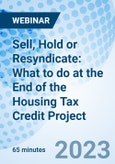Understand the steps you can or should be taking as the LIHTC project enters Year 15.
This panel is intended for owners (for-profit and non-profit) and property managers who are involved in Low-Income Housing Tax Credits (LIHTC) projects to understand the steps they can or should be taking as their LIHTC project enters Year 15. Year 15 is the end of the IRS 15-year LIHTC compliance period and can be an opportunity for the LIHTC owners to restructure their project ownership and explore possible redevelopment and refinancing opportunities including a possible sale, refinance, investor exit, new LIHTC financing and homeownership conversion. The presentation will explain the typical ownership structure in LIHTC projects, what the options are for owners in year 15, what the LIHTC project documents usually provide as to Year 15, as well as discussion topics with the LIHTC equity investor for year 15. This panel will cover the Rights of First Refusals and Purchase Options, which are often negotiated in LIHTC projects, especially with non-profit sponsors of LIHTC projects. Finally, the presentation will describe the considerations a LIHTC owner should review about their project as well as what notices and approvals may be required in connection with Year 15.
Learning Objectives
- You will be able to describe a typical LIHTC ownership structure.
- You will be able to discuss the process of converting LIHTC projects to homeownership by tenants.
- You will be able to explain resyndication transactions and acquisition tax credits.
- You will be able to review purchase options and right of first refusal contracts for the main considerations enter-ing into Year 15.
Agenda
LIHTC Ownership Through Year 15
- An Overview of the LIHTC Ownership Structure
- Different Viewpoints of Parties in Approaching Year 15
- Planning for Year 15 (Physical, Financial, and Legal Condition of the Property)
Major Contractual Considerations
- Identifying Existing Restrictions
- How to Discuss With Equity Investor
- Year 1 Contracts (Purchase Options and Rights of First Refusal)
Resyndication and Tax Considerations
- Qap and Political Considerations for the Project
- Financial Considerations for Resyndications
- Eligibility for Acquisition Tax Credits
Homeownership Opportunities
- Extended Use Restrictions Preventing Homeownership Uses
- Lease Purchase Under Section 42(G)(C)
- Real Estate Considerations for Homeownership
Questions and Answers
Speakers

Stuart D. Poppel,
Poppel Law LLC- Poppel Law LLC
- Concentrates practice on representing both for-profit and non-profit developers of affordable rental housing
- Over 23 years, has closed over 200 Low Income Housing Tax Credit projects for developers
- As well as investors across the country
- Projects have also utilized state tax credits, the historic rehabilitation tax credit and solar and energy tax credits as well as various forms of federal financing such as HUD’s HOME, CDBG and Rental Assistance Demonstration Program (and previously HUD Hope VI and HUD Mixed Finance Programs)
- J.D., Emory University School of Law, 1994; B.A., Political Science, Johns Hopkins University, 1991

Martin Walsh,
Reno & Cavanaugh, PLLC- Member at Reno & Cavanaugh PLLC
- Specializes in providing legal assistance structuring, financing and closing multifamily affordable housing developments for range of clients across the country including nonprofit and for-profit developers, public housing authorities, other public agencies, and lenders
- Provide legal assistance structuring, financing and closing multifamily affordable housing developments for range of clients across the country including public housing authorities, nonprofit and for-profit developers, public agencies, and lenders.
- Represent major national bank as lender’s counsel on affordable housing transactions involving federal low income housing tax credits, tax-exempt bonds, HUD assistance and other state and local funding sources.
- Possess expertise with all major affordable housing funding programs including Rental Assistance Demonstration program, Faircloth-to-RAD, FHA mortgage insurance, Section 8 project based rental assistance, HUD 202/811, HOPE VI, Choice Neighborhoods, Public Housing Capital and Operating funds, Moving-to-Work funding, federal low income housing tax credits, tax exempt bonds, HOME funds, CDBG funds, Federal Home Loan Bank Affordable Housing Program funds, Neighborhood Stabilization Program funds, ARRA funding and other public and private sources.
- Wharton School of Business, M.B.A., Real Estate; University of Pennsylvania Law School, J.D.; Pennsylvania State University, B.A. in Philosophy

Jake Greenberg,
Reno & Cavanaugh, PLLC- Representation of a public housing authority in two Year-15 transactions for Mixed-Finance developments, including the transfer of limited partnership interests of the owner of a 148-unit Mixed-Finance project to the public housing authority, and in the Department of Housing and Urban Development (HUD) approval and required documentation for the transfer of ownership interests of a 59-unit Mixed-Finance property
- Representation of a public housing authority in its role as a lender, ground lessor, and managing general partner in a mixed-income 90-unit development, including the RAD conversion of 17 units, 62 additional Project-Based Voucher (PBV) and PBV replacement units, 10 market rate/unrestricted units, and one manager’s unit.
- Representation of a public housing authority in mixed-income 4% and 9% LIHTC transaction using CNI Funds, consisting of 172 units of mixed-income rental housing within a 12-story mixed-use building, including 54 project-based voucher Section 8 units as replacement units subject to LIHTC, 46 Workforce Units subject to LIHTC, 30 additional LIHTC units, and 42 market-rate units.
- Representation of a public housing authority in two phases of a Section 18 Disposition, including in its role as a lender, and ground lessor through its non-profit affiliate, for the development of two 104-unit developments, each containing 104 PBV and LIHTC units.
- Representation of a non-profit developer in the purchase and financial closing for the development of a 69-unit development, across two buildings, of which 55 are LIHTC units and 14 are market-rate units, along with 2,214 square feet of ground floor commercial space for local businesses and nonprofits.
- Representation of a public housing authority in a series of PBV AHAP transactions under the MTW program, in which the public housing authority has entered into a series of Agreements to Enter into Housing Assistance Payment Contracts (AHAPs) for diverse project types consisting of a total of 423 PBV units.
- Member of ABA Forum on Affordable Housing and Community Development Law, Virginia Bar and D.C. Bar
- University of Virginia School of Law
Who Should Attend
This live webinar is designed for property managers, landlords, attorneys, presidents, vice presidents, building owners and managers, developers, housing officials, real estate professionals, government officials, planners, directors, administrators, and accountants.











